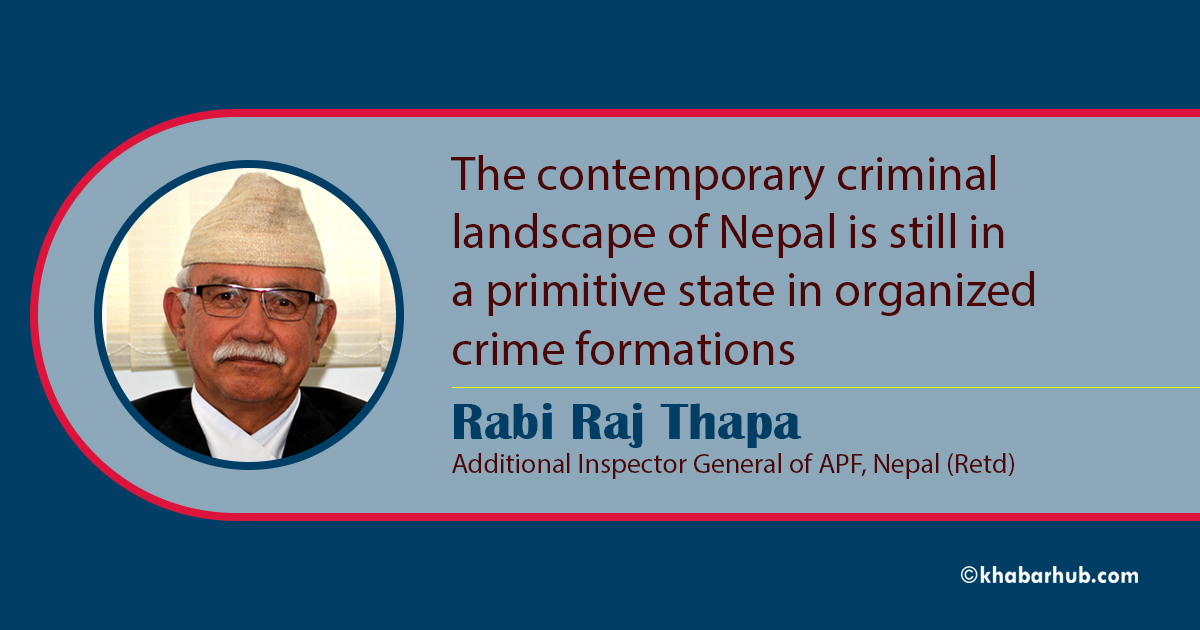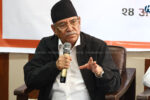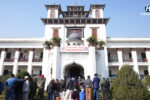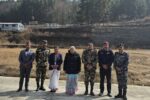There is always the probability of strong relationship among transnational organized crime groups, the government, semi-government agencies, and irregular formations. It is because, at the fundamental level, motivations and aspirations of all these agencies and groups may be similar, i.e. making money or profit as quickly as possible whether in a semi-legitimate or illegitimate manner.
For this, they are ready to use any modus operandi. The end result is the harm caused to the nation and society. More often, it is very difficult to distinguish one crime group from another. In this way, they all can be taken as “the silent partners” of the legitimate government agencies, semi-government corporations and the organized crime groups (OCGs). And wherever their interest converges they stand at a single platform, i.e. the Organized Crime.
Unfortunately, in this post-conflict scenario of Nepal, the nexus between crime and political parties seems to be getting deeper and stronger and getting immune to the law of the land.
Silent partners of the Organized Crime Group can express as any of these: a private party or person, a government officer or his office, a semi-government official and a group of people belonging to and affiliated with these organizations. There may be another similarity among them: they all do their utmost to avoid their appearances in public or willingly acknowledge their involvement (in any form and deeds) in an undertaking colluded together. There are many ways such organized syndicates collude to apply their methods — be it soft, peaceful or even gruesomely violent in nature to access state power, wealth and other government resources.
They do not hesitate to apply even illegitimate means such as protecting racketeers, capturing public resources, seizing the property of others and grabbing land forcibly in an illegitimate way, and eventually entering into the licit private sector by money laundering and other related means. Keywords such as organized crime, organized crime groups (OCGs), transnational criminal groups, corruption, and fragile-state introduction are commonly heard in Nepal. Felbab-Brown writes, ‘Rather than focusing on adopting lasting governance procedures to advance the national interest and well-being of all Nepalese, political competition in Nepal has centered on narrow, parochial competition between a variety of power-brokers seeking to leverage their control of specific communities, voting blocks, resources and patronage networks (Felbab-Brown, 2013)’.
Felbab-Brown has interpreted Nepal as a deeply improvised but resource-rich country that can ill afford further political paralysis and Nepal’s politics over the past few years characterized as a protest without prescription (Felbab-Brown, 2013, pp. 56-57). For any external observer like Felbab Brown, contemporary Nepal looks like a process leading to severe degradation in an administrative capacity, a pervasive lack of merit-based personnel system, and poor service delivery (Felbab-Brown, 2013, p. 57).
In the past two decades, especially during the armed conflict of 1996-2006, many parts of Nepal were controlled by irregular armed groups, political parties, local armed groups, and criminal gangs but less by the state government. Despite all these, organized criminal acts, encompassing both politically-motivated and economically-driven crimes, are still in its initial developmental stages (Felbab-Brown, 2013, p. 57).
Unfortunately, in this post-conflict scenario of Nepal, the nexus between crime and political parties seems to be getting deeper and stronger and getting immune to the law of the land. Politicians are collaborating with criminal groups for political purposes, including demonstrating street power, raising money for the party, and securing contracts for clients and so many government undertakings.
Like any weak and fragile countries of Asia, Africa and South America; criminal groups in Nepal are increasingly gaining power and money; spreading their tentacles wider and wider, faster and gaining more ferocity.
The contemporary criminal landscape of Nepal is still in a primitive state in organized crime formations. The criminal groups tend to be mostly small, territorially limited organizations, and their operation is not highly complex (Felbab-Brown, 2013, p. 57). Many commitments of zero-tolerance on ‘crime and criminals’ have been repeatedly emphasized by the successive governments of Nepal since the political changes of 1990 till date, and especially after the second people’s revolt 2006.
Nepal seems to have become a fertile ground for the Organized Groups (OCGs) and their silent partners in recent times. It would be pertinent to understand the appropriate meaning of organized crime. Gus Taylor (1962) defines organized crime, which crops up mostly in the new areas of new business enterprise’ and he further reiterates, ‘the serious threat of violence and crime appear at the times of greatest social change, involving rapid migration of population, the shifting of industries, the contact and clash of subcultures, the improvement of living standard, and the opening of new perspectives for which people are not yet prepared”.
At the present context, Nepal seems to be falling more and more on the trap of criminals of Organized Crime Groups (OCGs). In any organized crime, the ‘big fishes’ have always proven to be stronger and smarter. Like any weak and fragile countries of Asia, Africa and South America; criminal groups in Nepal are increasingly gaining power and money; spreading their tentacles wider and wider, faster and gaining more ferocity.
At the present juncture, people are apprehensive of a strong possibility of the development of strong nexus and partnership between government, regular/irregular groups and the OCGs to work as silent partners in legitimate business in an illegitimate way which may harm the country and the people in the long run.
After the promulgation of the Federal Constitution 2015, Nepal is in a process of restructuring its whole system and processes. Therefore, it is but natural to be a fragile state, more vulnerable to all types of challenges, including social disorder, dissension and organized transnational crimes. In such a precarious and vulnerable situation, organized and transnational crime may become far stronger and institutionalized because they are always on a move to find a platform for their criminal operation as a safe haven, a transit point or even a criminal base that may threaten and destabilize the whole South Asian region.
There is a growing trend of writing biographies and books by many prominent social elites of various disciplines whether it is the chief justice of the Supreme Court, the Army Chiefs, Inspector General of Police or the journalists, business tycoons and pilots. Their books have helped Nepalese people to understand the depth of our economic social and political environment where an illegal, unethical partnership between the government stakeholders, power brokers, manipulating private parties with various national and international organized crime groups are working together.
In this regard, former Chief Justice Sushila Karki has mentioned some of the big cases dealt by her in her book, ‘Nyaya’ [Justice] (Karki, 2018, pp. 217-299). In her book, she has clearly indicated the public, government officials and general public working like the silent partners who engage in corruption, illegal and illegitimate transaction amounting to crime in one way or another.
One of the former IGPs of Nepal Police, Achyut Krishna Kharel elaborates some of the cases of the criminalization of politics and politicization of crime by politicians, ministers, and high-level government officials in his biography. He has boldly written the involvement of government ministers and their involvement in gold smuggling through the international airport of Nepal (Kharel, 2018).
A prominent journalist of Nepal, Sudheer Sharma has depicted Nepal as what he calls a ‘laboratory’ of foreign agents, organized crime groups, commission agents and various nefarious activities from Nepal as a platform.
Similarly, several incidents of past decades have been written about the organized crime nexus in Nepal which has highlighted the spate of crimes like to murder, assassination, and terror orchestrated by the notorious criminal Dawood Ibrahim, the kingpin of organized crime for last two decades. Indian counterfeit currency and assassinations of the parliamentarian Mirja Dil Sad Begh, Media Tycoon Jamim Shah and Faijan Ahmad are some of the examples the crimes involving international crime gangs taking place on the turf of Nepalese territory.
(To be continued)
Views expressed in this article are the author’s own and do not necessarily reflect the stance of Khabarhub.









Comment